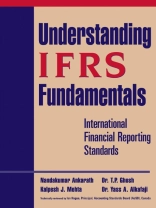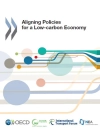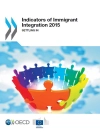A one-stop resource for understanding and applying current
International Financial Reporting Standards
The move to International Financial Reporting Standards (IFRS)
is the single most important initiative in the financial reporting
world, with more than 100 countries requiring or allowing the use
of IFRS for the preparation of financial statements by publicly
held companies. It is expected that by 2011, more than 150
countries will be converting to it.
It’s clear that IFRS is here to stay–get the expert advice
you need to properly implement IFRS with Understanding IFRS
Fundamentals: International Financial Reporting Standards.
Filled with easy-to-follow examples and case studies,
Understanding IFRS Fundamentals: International Financial
Reporting Standards is your handy resource to all things IFRS,
presenting:
* Authoritative advice and simple explanations of IFRS
standards
* Topical arrangement of issues of common interest to financial
statement preparers and users
* Extracts from published financial statements illustrating
practical implications for applying IFRS
* Guidance for finance professionals in more than 100 countries
that have either adopted or adapted to IFRS
* Simple explanations of complex standards
A practical reference with the answers to your issues of
interest, Understanding IFRS Fundamentals: International
Financial Reporting Standards serves as an essential resource
for when you need information in a hurry.
Stay on track and focused with the straightforward guidance in
Understanding IFRS Fundamentals: International Financial
Reporting Standards.
Spis treści
Preface vii
About the Authors ix
Introduction xi
1 Introduction to International Financial Reporting Standards 1
2 IASB Framework 11
3 Presentation of Financial Statements (IAS 1) 17
4 Inventories (IAS 2) 27
5 Statement of Cash Flows (IAS 7) 35
6 Accounting Policies, Changes in Accounting Estimates, and Errors (IAS 8) 41
7 Events After the Reporting Period (IAS 10) 49
8 Construction Contracts (IAS 11) 53
9 Income Taxes (IAS 12) 59
10 Property, Plant, and Equipment (IAS 16) 69
11 Leases (IAS 17) 77
12 Revenue (IAS 18) 87
13 Employee Benefits (IAS 19) 95
14 Accounting for Government Grants and Disclosure of Government Assistance (IAS 20) 107
15 The Effects of Changes in Foreign Exchange Rates (IAS 21) 111
16 Borrowing Costs (IAS 23) 119
17 Related-Party Disclosures (IAS 24) 123
18 Accounting and Reporting by Retirement Benefit Plans (IAS 26) 131
19 Consolidated and Separate Financial Statements (IAS 27) 143
20 Investments in Associates (IAS 28) 155
21 Financial Reporting in Hyperinflationary Economies (IAS 29) 163
22 Interests in Joint Ventures (IAS 31) 171
23 Financial Instruments: Presentation (IAS 32) 177
24 Earnings Per Share (IAS 33) 187
25 Interim Financial Reporting (IAS 34) 195
26 Impairment of Assets (IAS 36) 207
27 Provisions, Contingent Liabilities, and Contingent Assets (IAS 37) 215
28 Intangible Assets (IAS 38) 223
29 Financial Instruments: Recognition and Measurement (IAS 39) 231
30 Investment Property (IAS 40) 261
31 Agriculture (IAS 41) 267
32 First-Time Adoption of International Financial Reporting Standards (IFRS 1) 277
33 Share-Based Payment (IFRS 2) 295
34 Business Combinations (IFRS 3) 305
35 Insurance Contracts (IFRS 4) 321
36 Noncurrent Assets Held for Sale and Discontinued Operations (IFRS 5) 331
37 Exploration for and Evaluation of Mineral Resources (IFRS 6) 339
38 Financial Instruments: Disclosures (IFRS 7) 345
39 Operating Segments (IFRS 8) 363
40 Financial Instruments (IFRS 9) 369
41 International Financial Reporting Standards (IFRS) for Small and Medium Enterprises (SMEs) 383
Index 395
O autorze
Nandakumar Ankarath is a Fellow Member of The Institute of
Chartered Accountants of India and a Senior Partner with Moore
Stephens, Chartered Accountants, United Arab Emirates. Nandakumar
has over 25 years of postqualification experience in auditing,
accounting, financial and management consultancy in various
business environments in India, Bahrain, and the United Arab
Emirates. He has also served as a member of the Committee on
Accounting Standards for Local Bodies formed by the governing body
of the Institute of Chartered Accountants of India to formulate
accounting standards for local bodies, autonomous bodies, and
nonprofit organizations in India.
Dr. T.P. Ghosh is a professor of accounting and finance
at Management Development Institute, India, and a visiting
professor of Wollongong University in Dubai, United Arab Emirates.
Dr. Ghosh, who has served as the Director of Studies of the
Institute of Chartered Accountants of India, New Delhi, has
authored two important reference books for accounting professionals
that include Accounting Standards & Corporate Accounting
Practices, 8th edition, 2008.
Dr. Yass A. Alkafaji is an Associate Professor of
Accounting at the American University of Sharjah, United Arab
Emirates. Dr. Alkafaji, who was the founder of Alkafaji &
Associates, Ltd., a Chicago-based public accounting firm, has been
a faculty member at Mississippi State University, Bowling Green
State University, and Northeastern Illinois University in the
United States. He has also been published in various journals
including the International Journal of Accounting,
Accounting Research Journal, International Journal of
Management, and Managerial Auditing Journal.
Kalpesh J. Mehta is a Fellow Member of the Institute of
Chartered Accountants of India and is a founding member of the CA
Section at M.T. EDUCARE (P) LTD., a premier institution for
imparting quality education in India. He is also a faculty member
at the Institute of Chartered Accountants of India.












